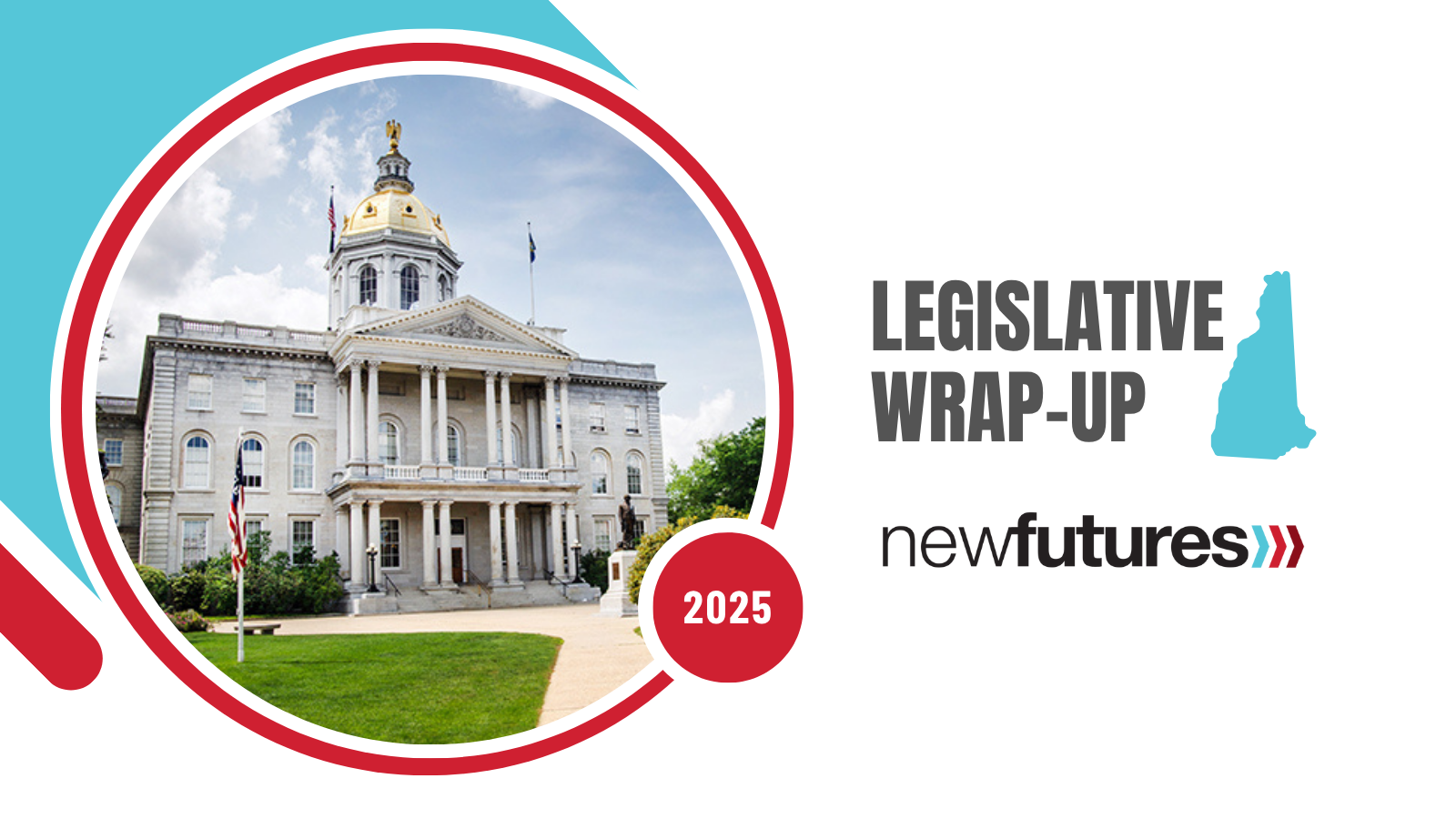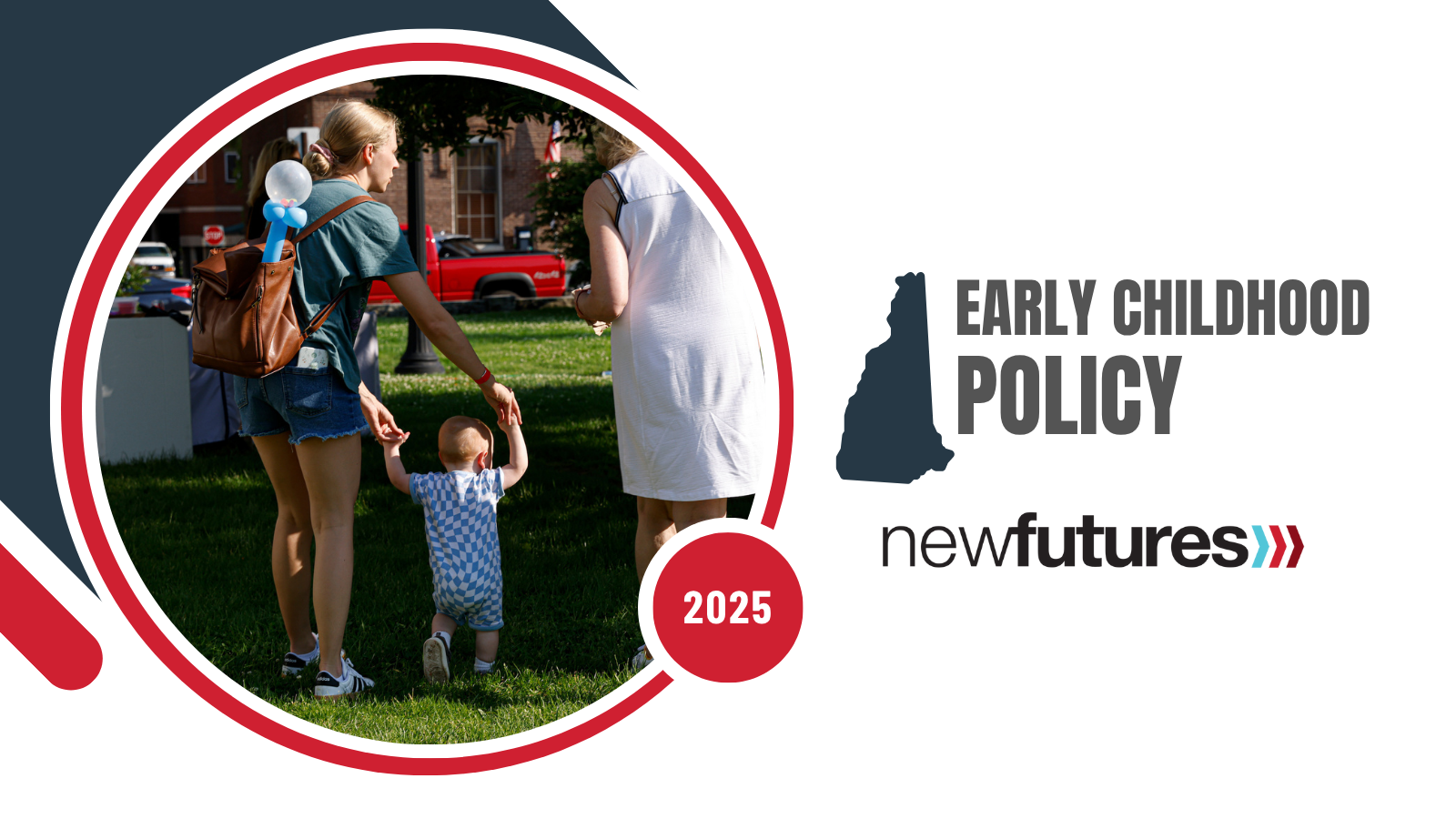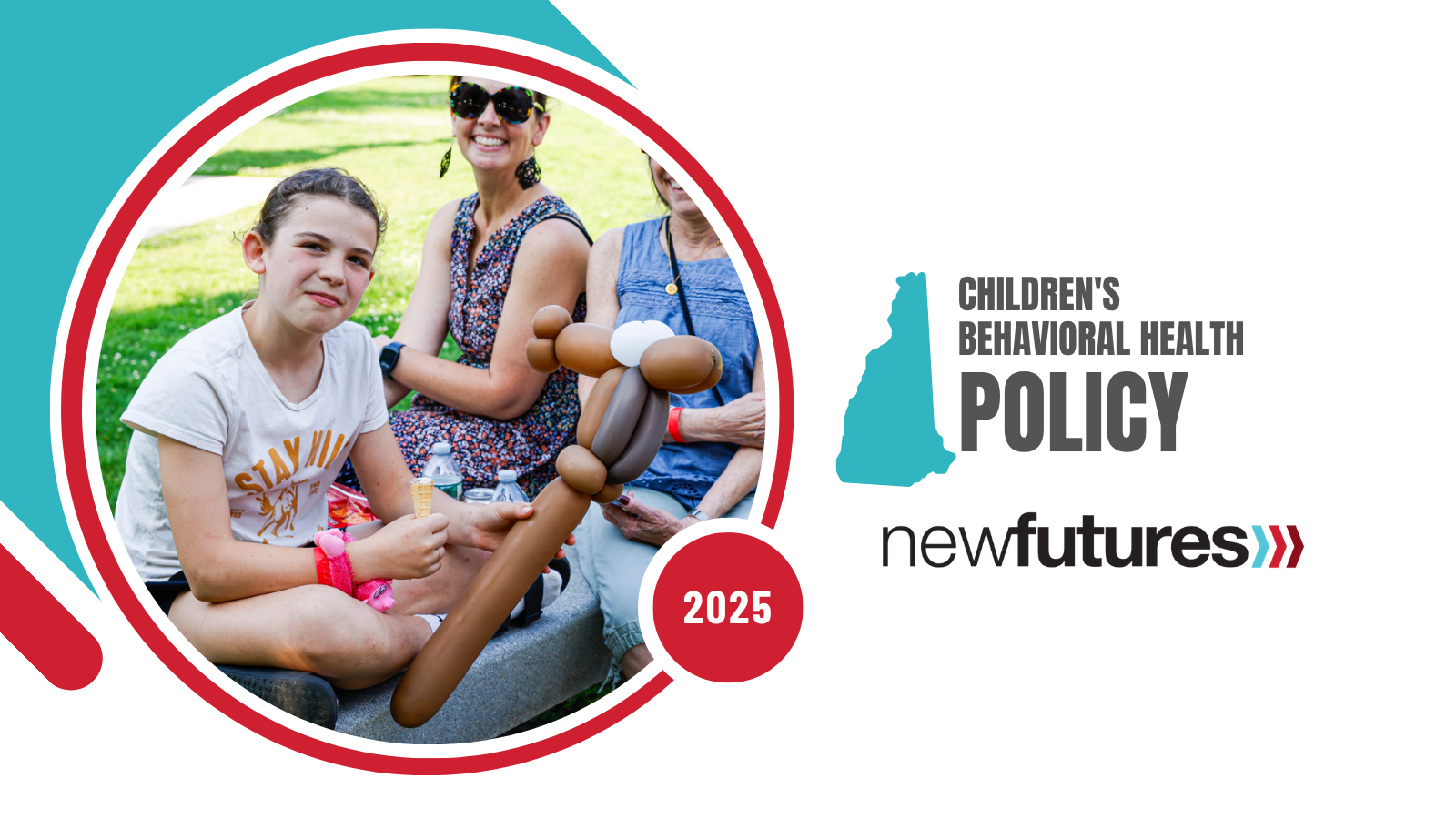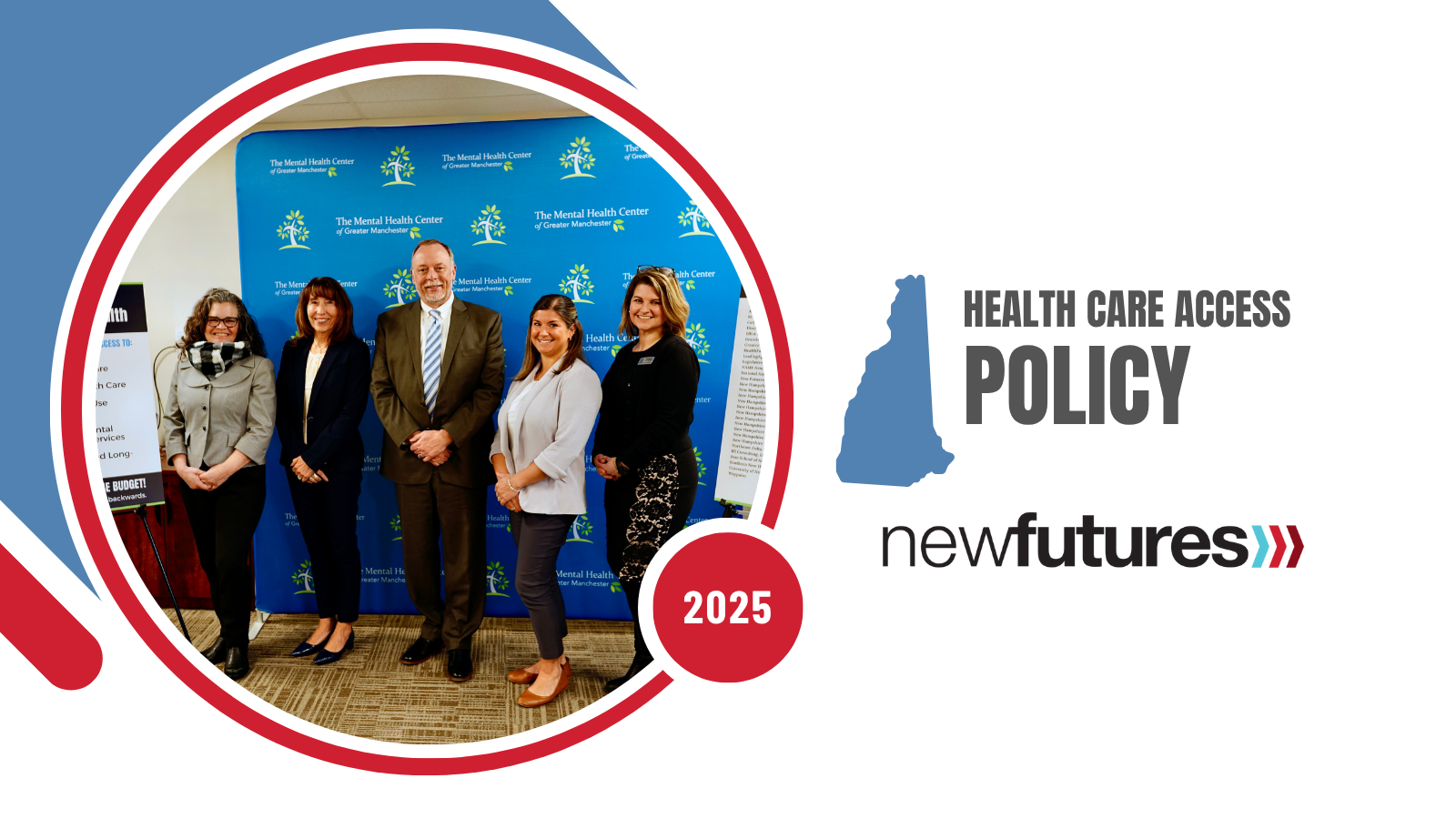2025 Legislative Wrap-Up

Each year from January to June, the New Futures staff works diligently to advance policies that improve the health and well-being of people across New Hampshire. Our policy team provides lawmakers with evidence-based data, our community engagement team inspires Granite Staters to get involved in the legislative process, and our communications team spreads the word about these important issues.
The 2025 Legislative Session wrapped up on June 26. In total, New Futures worked on more than 200 pieces of legislation throughout the year, including 26 priority bills as well as the state budget.
Scroll down to read through each bill, or jump to an issue area that you care about:
Early Childhood | Children's Behavioral Health | Health Care Access | Healthy Aging | Public Health | Substance Use Disorder
Early Childhood

Building strong children and families is how New Hampshire builds a strong foundation for its future. Families should have access to affordable early care and education, home visiting, and family support and strengthening programs.
Our 2025 Priorities: New Futures focused on maintaining the state’s investment in the New Hampshire Child Care Scholarship Program, correcting administrative barriers within the program, protecting access to home visiting and family resource centers, and expanding supports for maternal health in New Hampshire.
✅ Wins:
- Momnibus 2.0: Recognizing that New Hampshire moms continue to face large gaps in maternal health and wellness, New Futures partnered with the New Hampshire Women’s Foundation, MomsRising NH, and Reproductive Equity Now to advance Senate Bill 246, a maternal health package that supports moms by improving maternal mental health screening and reducing barriers to mental health care, trains EMS providers in rural counties on labor and delivery emergencies, strengthens workforce protections to ensuring parents can get the time off they need to attend postpartum and pediatric appointments. This bill was included in the state budget bills and was signed into law.
- Access to Affordable Child Care: The New Hampshire Child Care Scholarship Program helps families access affordable, quality child care in the state. However, complex paperwork requirements, upfront payment demands, and burdensome data tracking for providers create significant barriers to accessing the program. New Futures championed Senate Bill 243, which streamlines the application and administration of the program to ensure families have better access to affordable child care. SB 243 was included in the state budget bills and was signed into law. Some provisions of the new policy go into effect by the end of 2025, while others begin in early 2026.
- Funding for Family Resource Centers & Home Visiting: Family resource centers are a specific network of community-based nonprofit organizations that provide an array of family-strengthening programs like home visiting, parent education, kinship navigation, youth programs, playgroups, developmental screenings, and more. In budget years, lawmakers have historically attempted to cut funding to these critical services. However, this year, no cuts were made to family resource centers or home visiting programs.
Children's Behavioral Health

The social and emotional health of Granite State children is key to their overall health. We work to support and strengthen our state’s System of Care for children and youth who experience behavioral health challenges and ensure that programs are youth- and family-driven. Our efforts also focus on preventing harmful policies before they impact child and youth mental health.
Our 2025 Priorities: New Futures worked to support mental health services for New Hampshire children through strengthening crisis care, advocating for access to comprehensive behavioral health care for all children, protecting teen voices, and defending against legislation that would harm LGBTQ+ Granite Staters.
✅ Wins:
- Protecting Teen Voices and the Youth Risk Behavior Survey (YRBS): The YRBS is a completely anonymous, optional survey that allows teens to privately share their experiences so parents, schools, and communities can prevent unsafe and unhealthy behaviors. Originally, House Bill 446 would have required schools to share YRBS questions with families via email before administering the survey. However, Amendment 42h was proposed, which changed the bill to require families to opt in to taking the survey. Opponents feared this would significantly reduce the likelihood of participation and make it impossible to learn how to keep Granite State youth safe and healthy. The bill passed through both the House and Senate despite overwhelming public opposition—in the House, opponents outnumbered supporters by a nearly six-to-one margin. Despite passage through the state legislature, Governor Kelly Ayotte vetoed this bill when it reached her desk, citing that parents already have an opt-out option and supporting the need for statewide data.
- Maintaining Anti-Discrimination Protections: New Futures and many partner organizations worked to defeat several bills that would have made life harder and less safe for transgender Granite Staters. These bills would have rolled back bipartisan discrimination protections in restrooms and locker rooms at places we all need access to, like hospitals, workplaces, libraries, restaurants, stores, and more. Senate Bills 38 and 268 died during the legislative session, but House Bill 148 was vetoed by Governor Ayotte, who said the bill would have opened the door for litigation against New Hampshire businesses.
❌ Setbacks:
- Mandatory Outing in Schools: New Futures followed two bills this session that aimed to require teachers to “out” students to their parents when requested — House Bill 10 and Senate Bill 96. Bills like these are harmful to all young people, not just members of the LGBTQ community, because they discourage adolescents from seeing their teachers as trusted adults they can turn to for support. SB 96 did not move forward after the bill’s Committee of Conference declined to file a report last month. Unfortunately, HB 10 was signed into law by Governor Ayotte and went into effect on July 1st. This was despite the efforts of many advocates, including those who signed in against the bill in the House (outnumbering proponents by nearly a 7:1 margin) and Senate (outnumbering backers of the bill by almost 19:1).
- Bans on Medically Necessary Care: Transgender teens, like all teens, have the best chance to thrive when they are supported and can get the doctor-prescribed medical care they need. Unfortunately, despite overwhelming opposition from the public, House Bills 377 and 712 were signed into law by Governor Ayotte on August 1. These laws prevent Granite State youth from receiving evidence-based, medically necessary care that research shows can benefit the mental health and well-being of transgender youth.
⏸️ Still Working:
- Strengthening Crisis Care: Senate Bill 255 was written to be a fiscally responsible, commonsense plan to permanently fund the New Hampshire Rapid Response Access Point (part of the national 988 Suicide & Crisis Lifeline network) using the same proven model that has worked for our 911 system for decades. In February, 295 advocates signed in to the Senate hearing to support the bill (and only two opposed it!). In March, the full Senate tabled the bill for possible inclusion in their version of the NH state budget. However, negotiations during the Committee of Conference resulted in the new funding mechanism being dropped from the final version of the budget. Luckily, general funds will be used for the NH Rapid Response Access Point for the next two years, but New Futures will continue to spread the word about the importance of permanent funding. Please share your personal or professional experience about the importance of 988 here.
- Coverage for Children's Behavioral Health Care Coordination: Senate Bill 128 would require private insurance companies to help pay for enhanced care coordination mental health services for youth, creating a partnership between public and private insurers. This would help all New Hampshire children get the care they need, no matter what type of insurance they have. At a Senate hearing in February, 179 advocates signed in to support the bill, and only six opposed it. The Senate voted to pass the bill before tabling it for possible inclusion in the Senate’s version of the NH state budget. In May, the Senate Finance Committee voted unanimously to include this policy in their version of the state budget. Unfortunately, the bill’s language was dropped from the budget during the Committee of Conference negotiations, leaving many New Hampshire families without timely access to critical care. New Futures will continue to champion this legislation in 2026. If you, a loved one, or a client/patient has either benefited from or struggled to access youth behavioral/mental health care, please share your experience here. The programs impacted include: enhanced care coordination, or "wraparound", also known as FAST (Families and Systems Together) Forward, early childhood wraparound, or Transitional Enhanced Care Coordination (TrECC).
Health Care Access

Granite Staters deserve quality, affordable health care, access to effective, evidence-based health programs, a health insurance market that focuses on consumer health, and an overall health system that aims to keep New Hampshire residents healthy.
Our 2025 Priorities: New Futures focused on maintaining New Hampshire's health care workforce and system, protecting Medicaid and Medicaid expansion at both state and federal levels, and defending the state’s Prescription Drug Affordability Board.
Policy Outcomes:
✅ Wins:
- Medicaid Reimbursement Rates: Appropriate Medicaid reimbursement rates help health care providers keep their doors open and serve patients across the health care spectrum including primary care, preventive services, behavioral health, and emergency care. In its state budget proposal, the NH House of Representatives attempted to cut these rates by three percent. However, the final state budget proposal restored the rates, which will help maintain access to care for all our residents.
- Maintaining NH’s Health Care Workforce: New Futures has worked with the New Hampshire Health Care Workforce Coalition since 2018 to address systemic health care workforce shortages that limit access to care for New Hampshire patients. This year, the coalition worked to advance Senate Bill 244, which would invest in important programs and initiatives that attract, train, and retain health care workers within the state. The bill was retained in a Senate committee for possible inclusion in the state budget proposal, but many of the provisions were ultimately not included. Notably, funding for the Family Medicine Residency Program in the North Country was included, which will create opportunities for doctors to work in rural and underserved areas and improve health care access for local residents.
❌ Setbacks:
- Federal Medicaid Changes: This year, the U.S. government considered funding cuts and changes to Medicaid in the federal budget process. In New Hampshire, Medicaid provides health insurance coverage to over 187,000 of our residents, including children, pregnant women, people with disabilities, veterans, and older adults in nursing homes. Children represent the largest enrollment group, accounting for nearly half of all Medicaid recipients. New Futures worked as a member of the NH Medicaid Matters coalition to protect New Hampshire’s Medicaid programs throughout the legislative session. On July 4, President Trump signed H.R. 1 (known as the One Big Beautiful Bill Act) into law, which will cut federal Medicaid spending by nearly $1 trillion over the next 10 years. It also includes several changes to Medicaid policy including work requirements, more frequent redeterminations, and reductions in state provider taxes, among other provisions, that will not only put financial strains on working families in New Hampshire, but will leave many without necessary health care.
- Medicaid Premiums and Cost-Sharing: Along with the federal changes to Medicaid, New Hampshire’s State Legislature also proposed changes to the program in the 2026-27 State Budget. Unfortunately, the final state budget shifts more costs to Medicaid enrollees and families by implementing premiums and increasing co-pays for some families and individuals covered by Medicaid expansion and the Children’s Health Insurance Program. For a family of three making $68,000 per year, the monthly premium could be $230 each month, with $4 co-pays per prescription. These provisions create additional financial burdens and barriers to care that may prevent Granite State kids and adults from accessing essential health care coverage. They are intended to go into effect in July of 2026.
- Medicaid Expansion Work Requirements: The Granite Advantage Health Care Program, more commonly known as Medicaid Expansion, is a unique New Hampshire solution that ensures all Granite Staters have access to health insurance. Senate Bill 134, along with state budget proposals and the federal budget proposal, introduced burdensome work requirements to Medicaid Expansion, creating unnecessary barriers to health insurance and putting thousands of low-wage Granite Staters at risk of losing their coverage. While SB 134 was retained in a House committee, work requirements were included in the final state budget proposal passed by both chambers, along with the federal One Big Beautiful Bill Act that was recently passed into law. As a state, New Hampshire is still finalizing the requirements and exemptions, so work requirements will not go into effect immediately. NH Medicaid Matters will share updates at NHNeedsMedicaid.com.
- Repealing the Prescription Drug Affordability Board: Health care affordability is a top priority for Granite Staters, and a recent survey found that one in four Granite Staters reported rationing or skipping medications due to cost. New Hampshire’s Prescription Drug Affordability Board (PDAB) is our state’s only independent, nonpartisan entity dedicated to addressing the high costs of prescription medications. Proposals to defund or eliminate the PDAB surfaced in House Bill 570, as well as the state budgets passed in both the House and the Senate, and the Board was ultimately repealed in the final state budget. Dismantling the PDAB is a devastating step backward for our state, undermining our strongest effort to address rising prescription prices and placing life-saving medications further out of reach for Granite Staters who need them.
Healthy Aging

All Granite Staters should have access to the services they need and the ability to choose where and how they age in New Hampshire. New Futures works to address the unique needs of older adults and ensure that New Hampshire supports its aging residents.
Our 2025 Priorities: New Futures championed initiatives to support our aging residents and strengthen our communities by promoting respite for caregivers; improving affordability of health care by expanding access to Medicare Savings Programs; protecting New Hampshire renters from arbitrary evictions; and preserving the vital New Hampshire Commission on Aging.
Policy Outcomes:
✅ Wins:
- Caregiver Respite Services: Caregiver respite services provide family caregivers with needed breaks, preventing burnout so they can continue to provide quality care for their loved ones. House Bill 704 aimed to invest in New Hampshire’s Alzheimer's Disease and Related Disorders (ADRD) Caregiver Respite program to better support family caregivers. Although the bill was retained in a House committee, an additional $100,000 of funding for the ADRD Caregiver Respite program was included in House Bill 1, the state budget bill, which was signed into law by Governor Ayotte—a win for family caregivers across the state!
❌ Setbacks:
- New Hampshire Commission on Aging: By 2030, 27% of New Hampshire's population is projected to be over 65 years old. The NH Commission on Aging is essential in preparing the state for this rapid demographic shift, ensuring all of our residents are supported as we age. The final state budget for 2026-27 includes a reduction in funding for the Commission on Aging, which will limit its ability to address the challenges facing New Hampshire's rapidly growing older adult population. However, advocates made a difference, as the first version of the bill eliminated the Commission on Aging altogether.
- Removal of DEI Initiatives: Diversity, Equity, and Inclusion (DEI) programs and initiatives help public institutions serve all residents effectively by creating tailored solutions to meeting differing needs and supporting economic growth through inclusive workplaces. Unfortunately, a ban on DEI language in state contracts and DEI initiatives in public institutions were included in the final budget.
- Housing Security for Older Adults: New Hampshire’s housing crisis has particularly affected our aging residents, who are the fastest-growing age group among the unhoused population. House Bill 60 puts Granite State renters at risk by removing tenant protections and allowing landlords to evict tenants without cause when their lease ends. No-cause evictions could exacerbate the ongoing homelessness crisis and negatively impact the health of Granite State children and adults. Unfortunately, the bill passed both the Senate and House of Representatives, and was signed into law by Governor Ayotte on August 1, 2025. Despite this, the voices of Granite Staters made a significant impact, causing lawmakers to amend the bill to reduce harm.
⏸️ Still Working:
- Supporting Senior Volunteer Programs: Senior volunteer programs address community needs, providing services like companionship and transportation to older adults and mentorship to kids, benefiting both the people served and the volunteers. These existing, high-impact programs create a more supportive and resilient Long-Term Services and Supports (LTSS) system and benefit everyone in New Hampshire. Along with its investments in caregiver respite services, House Bill 704 proposed investing in New Hampshire's AmeriCorps Seniors volunteer programs. While the bill was retained in a House committee, funding only one senior volunteer program was included in the final state budget. As AmeriCorps volunteer programs are facing federal cuts as well, New Futures is following the latest developments and exploring how we can ensure these essential community service programs can continue serving our residents.
- Expanding Medicare Savings Programs: New Hampshire’s Medicare Savings Programs (MSPs) pay for uncovered Medicare costs, but far too many low-income older adults still don’t qualify for assistance. Senate Bill 122 would have expanded eligibility for MSPs to ensure that more older adults have access to affordable health care, which would improve health outcomes, reduce financial burdens, and strengthen the health of our communities. SB 122 passed the Senate but was ultimately tabled and not included in the Senate's state budget proposal. New Futures will investigate the potential for improvements to the MSPs in the next legislative session, helping older adults avoid the difficult choice between paying for health care and other essential needs. If you or your family has been impacted by medical costs not covered by Medicare, please share your experience.
Public Health

Protecting New Hampshire’s public health system is critical to ensuring Granite Staters have every opportunity to start healthy and stay healthy. Public health policies prevent diseases, protect Granite Staters, and increase public awareness and education.
Our 2025 Priorities: New Futures fought against attempts to weaken access to immunizations for New Hampshire families, as well as legislation that tried to loosen immunization requirements in schools and child care centers.
✅ Wins:
- Defeated Changes to Immunization Requirements: Several bills proposed by the legislature attempted to change immunization requirements in some way. The worst of these bills was House Bill 679, which would have changed the scientific standard for approving vaccines, essentially removing all childhood immunization requirements in New Hampshire and risking critical federal funding for child care.
⏸️ Still Working:
- Protected the New Hampshire Vaccine Association: In New Hampshire, immunizations are free to all families that want them through an innovative program: the New Hampshire Vaccine Association (NHVA). House Bill 524 would repeal the NHVA, increasing premiums for those with private health insurance and pushing inventory management and billing expenses onto providers. New Futures, insurance companies, and numerous providers testified against this bill, which narrowly passed the House of Representatives on a first vote. The bill was retained in the House Ways and Means Committee, meaning the Committee must bring it back in 2026.
Substance Use Disorder

Policies that support evidence-based prevention, treatment, and recovery programs are crucial to ensure that every New Hampshire resident is a healthy member of our society.
Our 2025 Priorities: New Futures worked to address New Hampshire's substance use disorder crisis by opposing mandatory minimum sentencing, advocating for stronger patient protections and quality standards in our substance use treatment system, expanding access to recovery housing, and ensuring the state invests in prevention, treatment, and recovery programming statewide.
Key Outcomes
✅ Wins:
- Opposing Mandatory Minimum Sentencing: Two Senate Bills, SB 14 and SB 15, proposed mandatory minimum sentencing for some drug-related offenses. Mandatory minimum sentences remove individuals from their communities, restrict access to needed treatment, and weaken our state's efforts to overcome the ongoing addiction crisis. Once introduced, both bills passed the NH Senate. A House committee then consolidated the two, retaining SB 14, and SB 15, now including text from both bills, passed the NH House of Representatives. The amended bill proceeded to a Committee of Conference to resolve differences between the chambers. While the House narrowly adopted the conference report by a vote of 185 to 182, the Senate ultimately tabled the legislation, effectively defeating both measures for the 2025 legislative session.
❌ Setbacks:
- Protecting the Alcohol Fund: For over twenty years, New Hampshire has taken an innovative approach to combat substance use disorders with the Alcohol Abuse Prevention & Treatment Fund ("Alcohol Fund") by directing five percent of gross profits from state liquor sales toward prevention, treatment, and recovery initiatives that are saving lives in communities. In 2023, New Hampshire generated $756.7 million in revenue at state-owned liquor stores. Just five percent of that ($10.7 million per year) funds the critical programs that support Granite Staters with substance use disorders. Ultimately, legislators voted to underfund the Alcohol Fund at $9.5 million per year from the state’s general funds, meaning taxpayers are paying for these services instead of using a small percentage of revenue from the state-owned liquor stores. Additionally, this puts the future of substance use prevention, treatment, and recovery efforts at risk as it sets the precedent to ignore the law that directs five percent of profits from liquor stores to the Alcohol Fund.
⏸️ Still Working:
- Strengthening NH’s Substance Use Treatment System: Although New Hampshire’s substance use treatment system has made significant strides over the past decade, there's more the state can do to ensure that patients receive the treatment and services they need. House Bill 751 proposed to improve our substance use treatment system by strengthening patient protections and ensuring high-quality services across the state. While HB 751 received a positive recommendation in its first House committee and initially passed the House of Representatives, it was tabled by the House Finance Committee, stalling the bill for the session. New Futures will continue to work to support strengthening New Hampshire's substance use treatment system in the years to come.
- Supporting the Development of Recovery Housing: In New Hampshire, access to housing remains one of the greatest obstacles for people facing substance misuse. Although recent years have shown an increase in certified recovery homes across the state, there are still not nearly enough available beds to meet the needs of our communities. House Bill 432 aimed to support the development of recovery housing in our state by helping cities and towns develop recovery housing resources. Despite compelling testimony about the life-saving impacts of recovery housing from many Granite Staters, the House of Representatives voted to table the bill, stalling it for the session. New Futures will continue to fight to support recovery housing through policy change. If you or someone you know has been impacted by recovery housing, please share your experience.
- Legalizing Drug-Checking Equipment: Under current law, possession with the intent to distribute lifesaving drug-checking equipment is a misdemeanor and punishable by up to one year in jail and a fine of $2,000. New Futures supported House Bill 226, which would have made the use and distribution of test equipment legal in New Hampshire. The bill was passed by the House of Representatives but was laid on the table in the Senate, effectively killing it.

